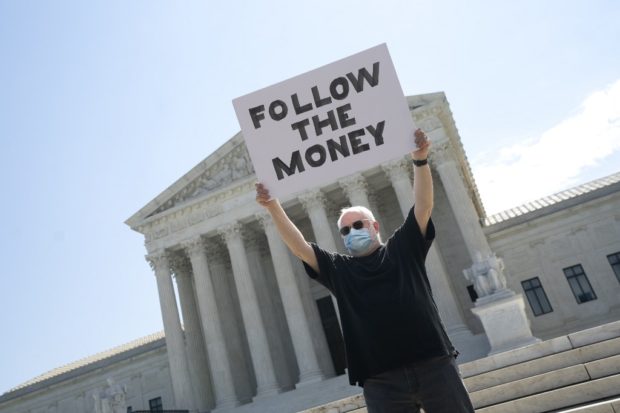Can Trump keep his finances secret? US Supreme Court to rule on cases
WASHINGTON — Can Donald Trump refuse to hand over his financial records to Congress and New York prosecutors simply because he is president of the United States? The Supreme Court will rule Thursday on two related cases to answer this, with potentially widespread political implications.

WASHINGTON, DC – JUNE 30: Bill Christeson holds a sign outside the U.S. Supreme Court on June 30, 2020 in Washington, DC. The court is expected to release a ruling that will determine whether President Trump can block the release of his financial records. Stefani Reynolds/Getty Images/AFP
The decision by the nine justices could lift the veil on Trump’s finances ahead of the November 3 election.
Unlike all of his predecessors since Richard Nixon in the 1970s, New York real estate mogul Trump refused to release his tax returns, despite promising to do so during his 2016 White House campaign.
Trump made his fortune a key component of that campaign, and his lack of transparency raises questions about his true worth and possible conflicts of interest.
Congressional investigations have raised questions about whether Trump has sensitive financial exposure to Russia, and also whether he has used questionable accounting loopholes to avoid paying taxes in the 1990s and 2000s.
Attorneys for Trump claim the president enjoys total immunity during his time in office, and that this is necessary so he can concentrate on his work without being “harassed” by prosecutors or lawmakers.
Article continues after this advertisementDuring the proceedings, one of the attorneys even argued that the president could shoot someone on 5th Avenue in New York and not be prosecuted until he left office — echoing a Trump 2016 campaign boast claiming that he would not lose any voters if he committed such a crime.
Article continues after this advertisementThe cases could have long-term implications for the ability of lawmakers to scrutinize presidents, as well as test the claim by Trump’s attorneys that a president is immune from criminal investigation while in office.
Stormy problems
One of the cases before the Supreme Court relates to an investigation opened by the state of New York, and poses the specific question of the president’s immunity from prosecution.
In April 2019, New York District Attorney Cyrus Vance, a Democrat, asked accounting firm Mazars — Trump’s longtime accounting firm — to provide him with eight years of the president’s financial records (2011 to 2018) in order to shed light on an alleged “hush money” payment made to porn actress and former Playboy model Stormy Daniels.
Such an unreported payment, made to obtain the silence of Daniels over an alleged affair with the billionaire Republican, would be a violation of state laws covering campaign finances.
Separately, two committees from the House of Representatives — under Democratic control — are seeking access to an array of financial documents from the same period in injunctions sent to Mazars as well as to Deutsche Bank and Capital One bank.
This second case raises issues over the balance between the executive and legislative branches of government.
Claiming to be the victim of a “witch hunt,” Trump has opposed all of these requests but has lost each case at first instance and on appeal. Now the Supreme Court, which has a majority of conservative justices including two appointed by Trump, will have the last word.
‘Don’t hold your breath’
At the hearing, which took place in May via telephone because of the novel coronavirus pandemic, the justices looked at each case differently.
In the case involving Congress, the four left-leaning justices defended the oversight role that the legislature has over the executive branch. But their five conservative colleagues, however, seemed inclined to consider certain requests for documents illegitimate.
In the New York case, however, there seemed to be little enthusiasm for arguments by Trump’s attorneys that criminal proceedings against a sitting president violated the US Constitution.
“The president isn’t above the law,” said Justice Elena Kagan.
Law professor Stephen Vladeck at the University of Texas at Austin made a prediction about the cases on Twitter: a split result for the case involving Congress, and a large defeat for Trump in the New York case.
Yet even if the Supreme Court authorizes Mazars to hand over Trump’s financial documents to New York prosecutors, there is no guarantee that the public will ever see them, said University of Michigan law professor Richard Lempert.
“Don’t hold your breath awaiting more information about his tax returns,” Lempert wrote on the Brookings Institute website. “Most likely, it will be a while before we know any details, and portions of his returns may remain forever secret.”